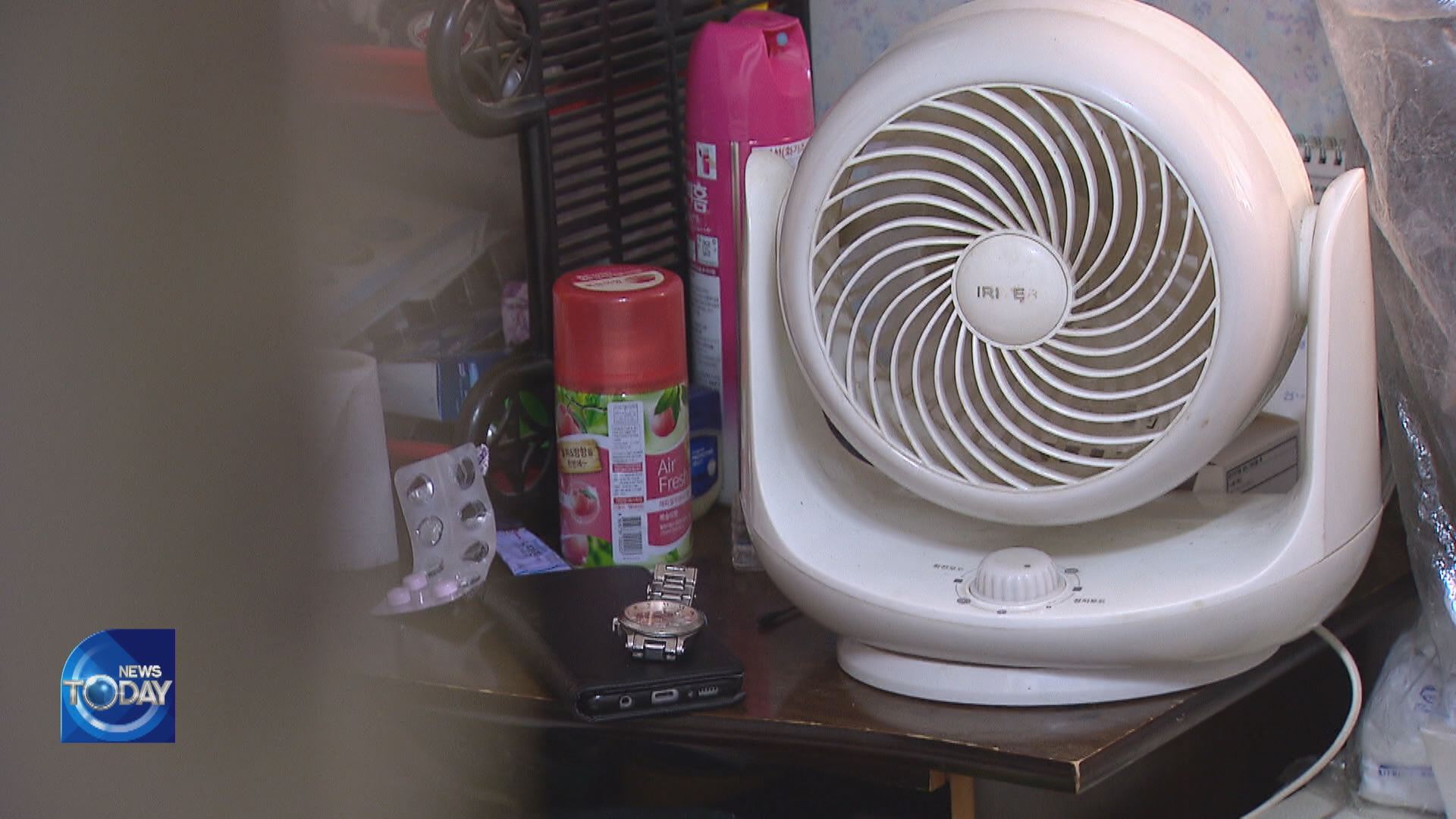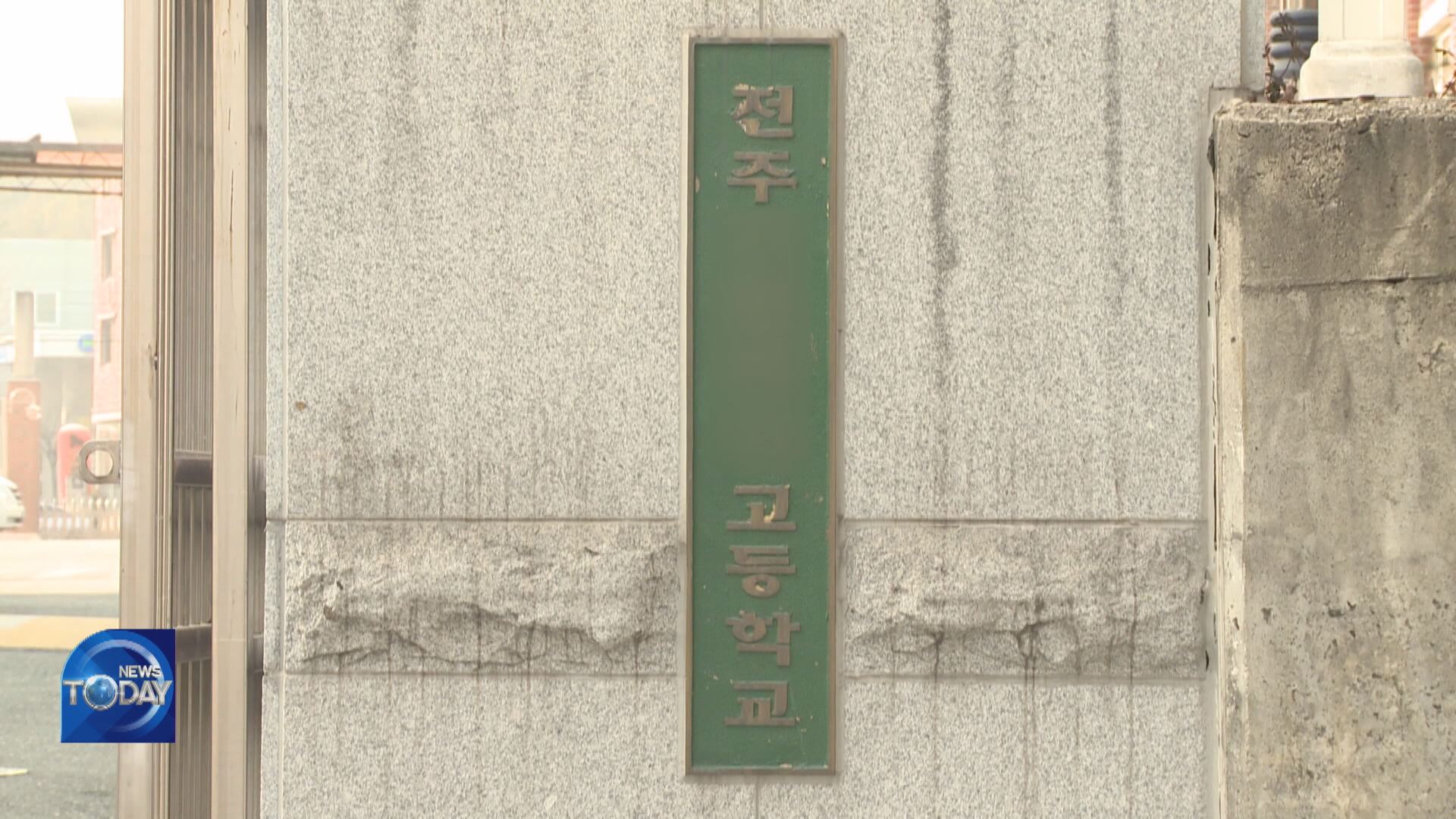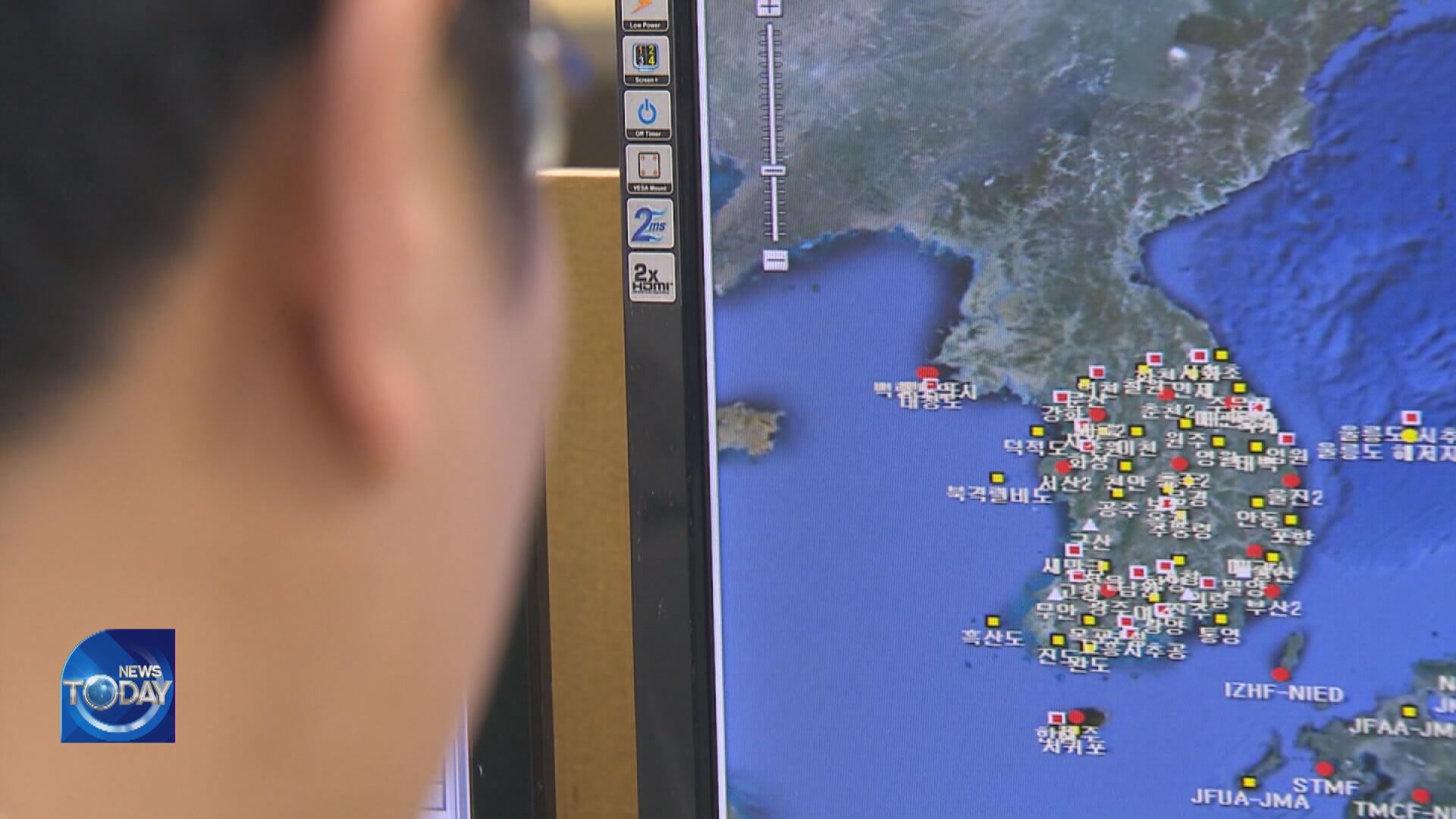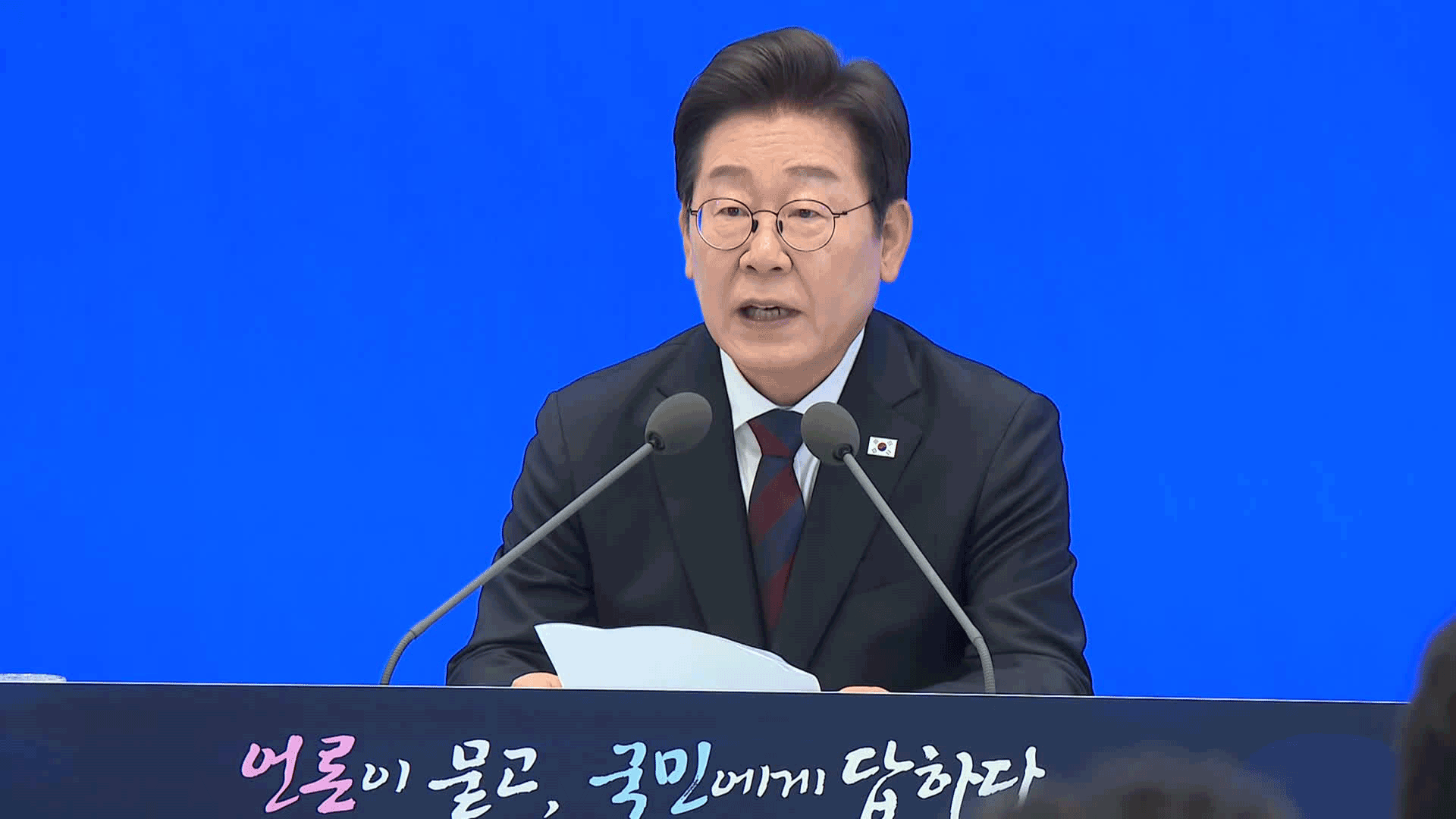SUMMER HEAT AFFECTS SOCIALLY VULNERABLE
입력 2022.07.21 (15:10)
수정 2022.07.21 (16:45)
읽어주기 기능은 크롬기반의
브라우저에서만 사용하실 수 있습니다.
[Anchor Lead]
Many people prefer to stay indoors during the sweltering weather. But some people who have no air-conditioners at home and nowhere to go have no choice but to endure the heat indoors. And many of them are children who have no one to help them.
[Pkg]
Min-seo, who turned 16 this year, leaves her home again as soon as she comes back from school. After searching for places to go, she heads to a community welfare center. This is the only place where she can escape from the hot weather and study for free.
[Soundbite] Kim Min-seo(Fictitious Name, VOICE MODIFIED) : "My school library closes at 4:30 p.m. I can stay there no longer than half an hour or an hour."
She finds it difficult to stay home in summer. Mainly because it's been a while since her air-conditioner broke down. Her home is poorly ventilated, because it's located just inches from the next building. The indoor temperature is even higher than outdoor even when it's unbearably hot outside.
[Soundbite] Kim Min-seo(Fictitious Name, VOICE MODIFIED) : "The back of my neck and my spine are drenched in sweat and it hurts. To me, being at home is not a pleasant experience."
Eun-ha, an eight-year-old living with her grandmother, is lucky to have AC at home. But she can enjoy it only briefly when she comes home.
[Soundbite] Eun-ha's Grandmother(Fictitious Name, VOICE MODIFIED) : "I'm worried that our electricity fees would be too high. I don't turn it on in the morning. I only turn it on when my granddaughter comes home."
During the monsoon season, rainwater permeates the house, making it even more humid. This causes mold and bad odors in the girl's home, which is located in the basement. Staying home during school breaks is even more worrisome for her and her grandmother.
[Soundbite] Eun-ha's Grandmother(Fictitious Name, VOICE MODIFIED) : "My granddaughter coughs and we have a lot of mold in our home."
A survey on impoverished households with children shows that humidity and mold account for 17.5 percent of hazards for children's health and safety. Nearly 70 percent is narrow spaces.
[Soundbite] Heo Sung-kwon(Child Fund Korea) : "It can be hazardous for health. Prolonged inconveniences at home can also cause depression."
Every year the government devises policies to help the socially vulnerable by providing energy vouchers and cooling devices. Receiving the benefits is not easy, as many of the eligible are either unaware of them or learn about them too late.
[Soundbite] Community Center Staff(VOICE MODIFIED) : "Few people actually receive those benefits. We have no way to know everyone eligible. Some of them come in advance to make requests."
The Ministry of Environment devised measures back in June to help children during heat waves. But they target facilities such as daycare centers rather than residential spaces. Eight out of ten low-income households that cannot receive any help have to endure the summer heat without air-conditioners. Their children would rather spend the summer at school than at home.
Many people prefer to stay indoors during the sweltering weather. But some people who have no air-conditioners at home and nowhere to go have no choice but to endure the heat indoors. And many of them are children who have no one to help them.
[Pkg]
Min-seo, who turned 16 this year, leaves her home again as soon as she comes back from school. After searching for places to go, she heads to a community welfare center. This is the only place where she can escape from the hot weather and study for free.
[Soundbite] Kim Min-seo(Fictitious Name, VOICE MODIFIED) : "My school library closes at 4:30 p.m. I can stay there no longer than half an hour or an hour."
She finds it difficult to stay home in summer. Mainly because it's been a while since her air-conditioner broke down. Her home is poorly ventilated, because it's located just inches from the next building. The indoor temperature is even higher than outdoor even when it's unbearably hot outside.
[Soundbite] Kim Min-seo(Fictitious Name, VOICE MODIFIED) : "The back of my neck and my spine are drenched in sweat and it hurts. To me, being at home is not a pleasant experience."
Eun-ha, an eight-year-old living with her grandmother, is lucky to have AC at home. But she can enjoy it only briefly when she comes home.
[Soundbite] Eun-ha's Grandmother(Fictitious Name, VOICE MODIFIED) : "I'm worried that our electricity fees would be too high. I don't turn it on in the morning. I only turn it on when my granddaughter comes home."
During the monsoon season, rainwater permeates the house, making it even more humid. This causes mold and bad odors in the girl's home, which is located in the basement. Staying home during school breaks is even more worrisome for her and her grandmother.
[Soundbite] Eun-ha's Grandmother(Fictitious Name, VOICE MODIFIED) : "My granddaughter coughs and we have a lot of mold in our home."
A survey on impoverished households with children shows that humidity and mold account for 17.5 percent of hazards for children's health and safety. Nearly 70 percent is narrow spaces.
[Soundbite] Heo Sung-kwon(Child Fund Korea) : "It can be hazardous for health. Prolonged inconveniences at home can also cause depression."
Every year the government devises policies to help the socially vulnerable by providing energy vouchers and cooling devices. Receiving the benefits is not easy, as many of the eligible are either unaware of them or learn about them too late.
[Soundbite] Community Center Staff(VOICE MODIFIED) : "Few people actually receive those benefits. We have no way to know everyone eligible. Some of them come in advance to make requests."
The Ministry of Environment devised measures back in June to help children during heat waves. But they target facilities such as daycare centers rather than residential spaces. Eight out of ten low-income households that cannot receive any help have to endure the summer heat without air-conditioners. Their children would rather spend the summer at school than at home.
■ 제보하기
▷ 카카오톡 : 'KBS제보' 검색, 채널 추가
▷ 전화 : 02-781-1234, 4444
▷ 이메일 : kbs1234@kbs.co.kr
▷ 유튜브, 네이버, 카카오에서도 KBS뉴스를 구독해주세요!
- SUMMER HEAT AFFECTS SOCIALLY VULNERABLE
-
- 입력 2022-07-21 15:10:00
- 수정2022-07-21 16:45:31

[Anchor Lead]
Many people prefer to stay indoors during the sweltering weather. But some people who have no air-conditioners at home and nowhere to go have no choice but to endure the heat indoors. And many of them are children who have no one to help them.
[Pkg]
Min-seo, who turned 16 this year, leaves her home again as soon as she comes back from school. After searching for places to go, she heads to a community welfare center. This is the only place where she can escape from the hot weather and study for free.
[Soundbite] Kim Min-seo(Fictitious Name, VOICE MODIFIED) : "My school library closes at 4:30 p.m. I can stay there no longer than half an hour or an hour."
She finds it difficult to stay home in summer. Mainly because it's been a while since her air-conditioner broke down. Her home is poorly ventilated, because it's located just inches from the next building. The indoor temperature is even higher than outdoor even when it's unbearably hot outside.
[Soundbite] Kim Min-seo(Fictitious Name, VOICE MODIFIED) : "The back of my neck and my spine are drenched in sweat and it hurts. To me, being at home is not a pleasant experience."
Eun-ha, an eight-year-old living with her grandmother, is lucky to have AC at home. But she can enjoy it only briefly when she comes home.
[Soundbite] Eun-ha's Grandmother(Fictitious Name, VOICE MODIFIED) : "I'm worried that our electricity fees would be too high. I don't turn it on in the morning. I only turn it on when my granddaughter comes home."
During the monsoon season, rainwater permeates the house, making it even more humid. This causes mold and bad odors in the girl's home, which is located in the basement. Staying home during school breaks is even more worrisome for her and her grandmother.
[Soundbite] Eun-ha's Grandmother(Fictitious Name, VOICE MODIFIED) : "My granddaughter coughs and we have a lot of mold in our home."
A survey on impoverished households with children shows that humidity and mold account for 17.5 percent of hazards for children's health and safety. Nearly 70 percent is narrow spaces.
[Soundbite] Heo Sung-kwon(Child Fund Korea) : "It can be hazardous for health. Prolonged inconveniences at home can also cause depression."
Every year the government devises policies to help the socially vulnerable by providing energy vouchers and cooling devices. Receiving the benefits is not easy, as many of the eligible are either unaware of them or learn about them too late.
[Soundbite] Community Center Staff(VOICE MODIFIED) : "Few people actually receive those benefits. We have no way to know everyone eligible. Some of them come in advance to make requests."
The Ministry of Environment devised measures back in June to help children during heat waves. But they target facilities such as daycare centers rather than residential spaces. Eight out of ten low-income households that cannot receive any help have to endure the summer heat without air-conditioners. Their children would rather spend the summer at school than at home.
Many people prefer to stay indoors during the sweltering weather. But some people who have no air-conditioners at home and nowhere to go have no choice but to endure the heat indoors. And many of them are children who have no one to help them.
[Pkg]
Min-seo, who turned 16 this year, leaves her home again as soon as she comes back from school. After searching for places to go, she heads to a community welfare center. This is the only place where she can escape from the hot weather and study for free.
[Soundbite] Kim Min-seo(Fictitious Name, VOICE MODIFIED) : "My school library closes at 4:30 p.m. I can stay there no longer than half an hour or an hour."
She finds it difficult to stay home in summer. Mainly because it's been a while since her air-conditioner broke down. Her home is poorly ventilated, because it's located just inches from the next building. The indoor temperature is even higher than outdoor even when it's unbearably hot outside.
[Soundbite] Kim Min-seo(Fictitious Name, VOICE MODIFIED) : "The back of my neck and my spine are drenched in sweat and it hurts. To me, being at home is not a pleasant experience."
Eun-ha, an eight-year-old living with her grandmother, is lucky to have AC at home. But she can enjoy it only briefly when she comes home.
[Soundbite] Eun-ha's Grandmother(Fictitious Name, VOICE MODIFIED) : "I'm worried that our electricity fees would be too high. I don't turn it on in the morning. I only turn it on when my granddaughter comes home."
During the monsoon season, rainwater permeates the house, making it even more humid. This causes mold and bad odors in the girl's home, which is located in the basement. Staying home during school breaks is even more worrisome for her and her grandmother.
[Soundbite] Eun-ha's Grandmother(Fictitious Name, VOICE MODIFIED) : "My granddaughter coughs and we have a lot of mold in our home."
A survey on impoverished households with children shows that humidity and mold account for 17.5 percent of hazards for children's health and safety. Nearly 70 percent is narrow spaces.
[Soundbite] Heo Sung-kwon(Child Fund Korea) : "It can be hazardous for health. Prolonged inconveniences at home can also cause depression."
Every year the government devises policies to help the socially vulnerable by providing energy vouchers and cooling devices. Receiving the benefits is not easy, as many of the eligible are either unaware of them or learn about them too late.
[Soundbite] Community Center Staff(VOICE MODIFIED) : "Few people actually receive those benefits. We have no way to know everyone eligible. Some of them come in advance to make requests."
The Ministry of Environment devised measures back in June to help children during heat waves. But they target facilities such as daycare centers rather than residential spaces. Eight out of ten low-income households that cannot receive any help have to endure the summer heat without air-conditioners. Their children would rather spend the summer at school than at home.
이 기사가 좋으셨다면
-
좋아요
0
-
응원해요
0
-
후속 원해요
0















![[단독] 도이치 주포 “김건희, 내 덕에 떼돈 벌어…22억 원 주문”](/data/news/2025/07/03/20250703_KpuU43.png)

이 기사에 대한 의견을 남겨주세요.